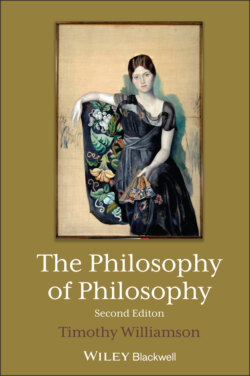Читать книгу The Philosophy of Philosophy - Timothy Williamson - Страница 21
Notes
Оглавление1 1 On vagueness in general see, for a start, Graff and Williamson (2002), Keefe (2000), Keefe and Smith (1997), and Williamson (1994a). On vague objects see Williamson (2003b) and references therein.
2 2 Classical logic is the standard logic of expressions such as “every,” “either … or …” and “not” on the assumption that there is a mutually exclusive, jointly exhaustive dichotomy of sentences into the true and the false.
3 3 See also Quine (1970: 11).
4 4 A recent example of a supervaluationist rejecting such disquotational equivalences for borderline cases is Keefe (2000: 213–20). For further discussion see Williamson (1994a: 162–4) and McGee and McLaughlin (2000).
5 5 Even if a word retains its linguistic meaning, its reference may shift with the context of utterance (“I,” “now,” “here”). If “dry” undergoes such contextual shifts, T2a and T2b may fail when interpreted as generalizations about utterances of “dry” in contexts other than the theorist’s own. It might be argued that concepts can also undergo contextual shifts in reference: you use the concept I to refer (in thought) to yourself but I use the same concept to refer to myself; at noon we use the concept now to think of noon but at midnight we use the same concept to refer to midnight; at the North Pole we use the concept here to refer to the North Pole but at the South Pole we use the same concept to refer to the South Pole. If so, TC2a and TC2b may also fail when interpreted as generalizations about uses of the concept dry in contexts other than the theorist’s own.
6 6 For intuitionist logic in general see Dummett (1977). For its application to the problem of vagueness see Graff and Williamson (2002: 473–506) and Chambers (1998).
7 7 One proves by mathematical induction on n that if An is the conjunction of n instances of excluded middle then ¬ is intuitionistically inconsistent.
8 8 This point does not generalize to the semantics of conditionals in fuzzy logic, given the popular rule that if the consequent is lower than the antecedent in degree of truth then the degree of truth of the conditional falls short of 1 by the amount by which the consequent falls short of the antecedent in degree of truth; otherwise the degree of truth of the conditional is 1. Hence if A has a higher degree of truth than B but both are indefi nite then A → B is indefi nite while B → A is perfectly true. Thus the information that the antecedent and consequent are indefi nite does not determine whether the conditional is indefi nite.
9 9 See Graff and Williamson (2002: 279–351) on higher-order vagueness.
10 10 See Williamson (1994a: 193–5).
11 11 Of course, monolingual speakers of another language may know whether Mars was always dry or not dry without ever hearing of the original question, which is an interrogative sentence of English; they use a synonymous sentence of their own language. They do not know whether the original English question has a positive answer. Someone may even know whether the original English question has a positive answer without understanding the question, because the knowledge can be passed along a chain of testimony; understanding of the original question is needed only at one end of the chain. These quibbles do not affect the argument.
12 12 The issue of Smith’s intentions concerns his thoughts, but we may suppose that the question immediately at issue is whether Smith was even involved in Jones’s death.
13 13 Non-testimonial evidence may be taken to include non-linguistic items such as a bloodied knife; this is what lawyers call “real evidence.” For an argument that all evidence in an epistemologically central sense of the term is propositional see Williamson (2000a: 194–200). For example, the evidence in this sense might include the proposition that the bloodied knife was found at the scene of the crime, but not the knife itself.
14 14 Popularization has its place, in philosophy as in physics, but should not be confused with the primary activity.
